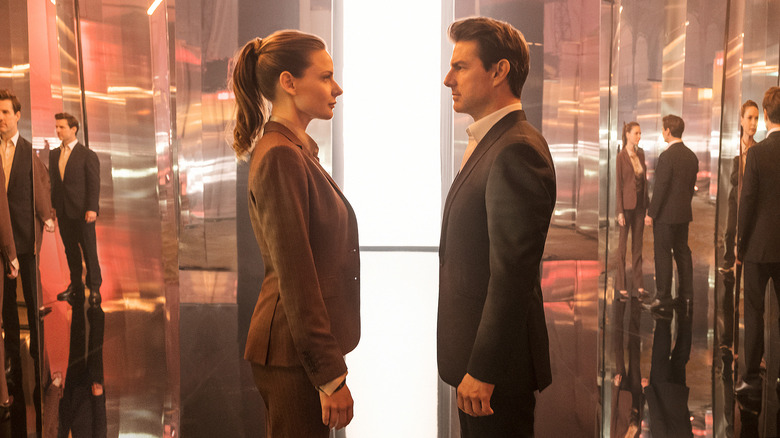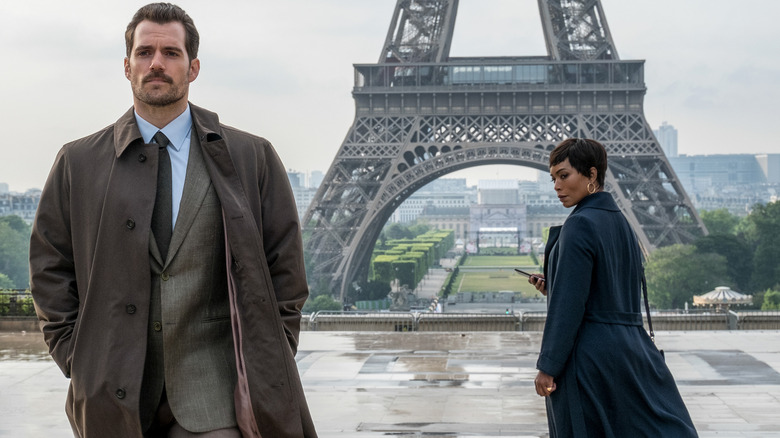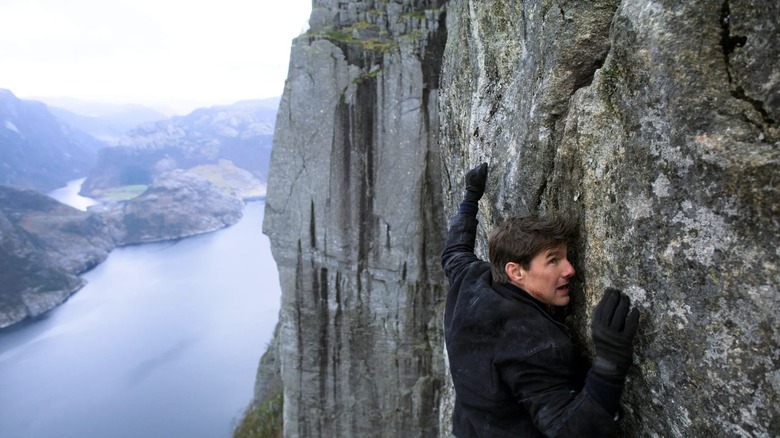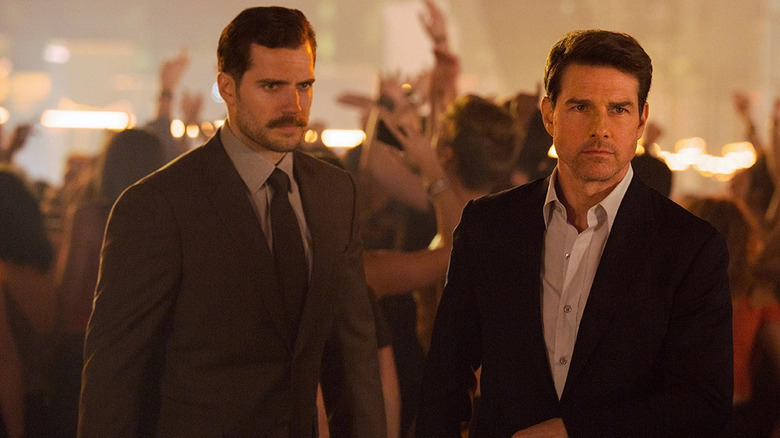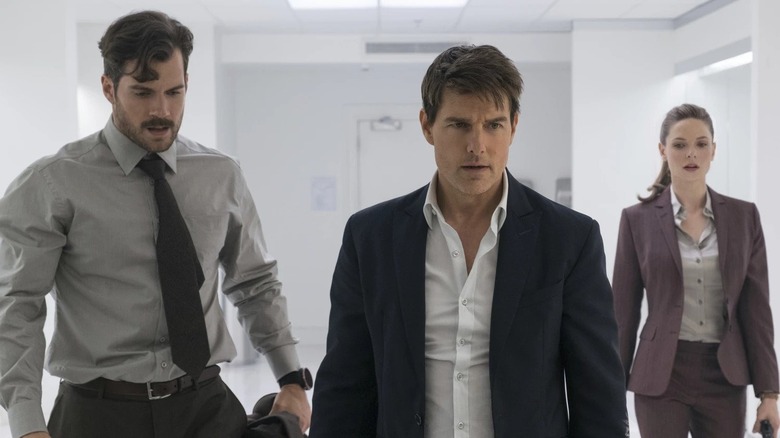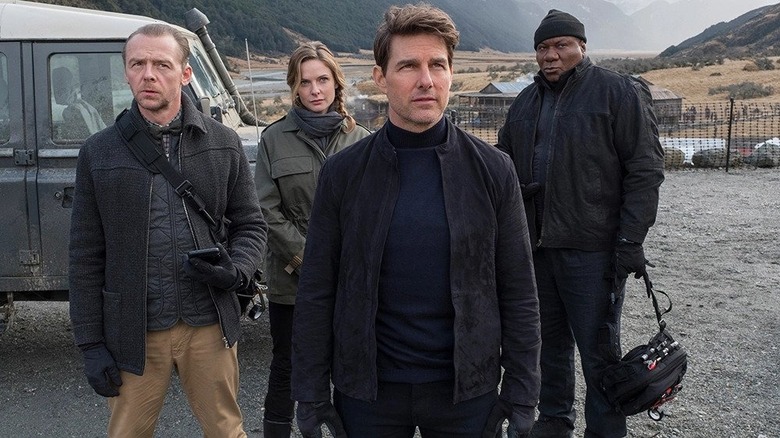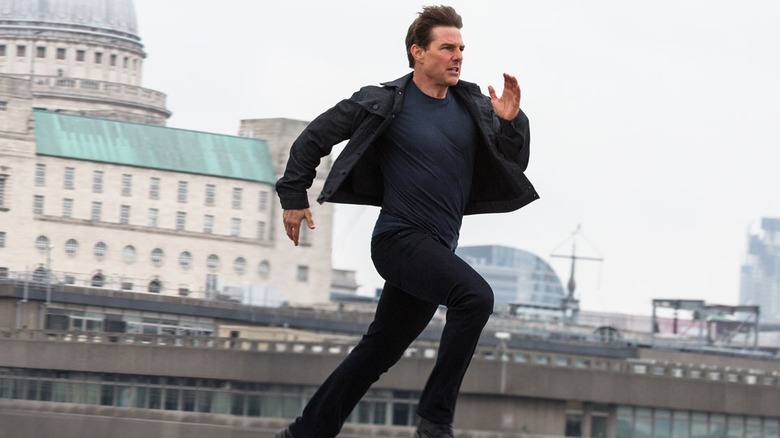Mission: Impossible - Fallout Set A New Standard For Action Filmmaking
(Welcome back to Man on a Mission, a series where we revisit the films of the "Mission: Impossible" franchise as we sprint toward the release of the seventh film later this month.)
For roughly the first 15 years of the ever-expanding "Mission: Impossible" franchise, one thing was true above all else: though each film would star Tom Cruise, there would be a different director behind the camera, with the intent of bringing their own unique eye to the proceedings.
Whatever you think of the various adventures of globe-trotting IMF agent Ethan Hunt, they do not look overly similar to each other. The first film may not be the height of Brian De Palma's New Hollywood auteurism, but it is very much a De Palma picture. The same is true of the second film looking and feeling like a John Woo title, and of J.J. Abrams taking the rein for the third entry and bringing a faux-Michael Bay jitteriness to the affair. Ethan may be unchanged, yet in a way, his surroundings do.
When Abrams stepped back as director and remained as a producer through his Bad Robot shingle with the fourth film, the reins were passed to the brilliant animator Brad Bird; though he, too, brought a different flair to "Ghost Protocol", he wound up setting a more consistent visual palette that's been followed leading up to the apex of the series, the 2018 film "Mission: Impossible – Fallout".
It was the man who followed in Bird's footsteps who took that directorial baton and has held it tightly ever since.
Inventive setpieces
Christopher McQuarrie first broke onto the scene with his Academy Award-winning screenplay to the neo-noir thriller "The Usual Suspects," whose impact is still felt three decades later in no small part due to its jaw-dropping twist ending. His path crossed with Cruise when he and director Bryan Singer collaborated on the 2008 historical thriller "Valkyrie"; since that time, McQuarrie has spent a good chunk of his career working on Cruise's films, either as writer, producer, or director.
When he did an uncredited rewrite on "Ghost Protocol," he ended up drastically revising the arc of the film so that it centered more on Ethan than on the new character William Brandt (Jeremy Renner), who was originally meant to take over as the lead of the series. Whatever Cruise's personal issues may be, McQuarrie's shift in storytelling aligned well with the truth of this franchise: Tom Cruise is "Mission: Impossible" and to try to impose a different rule upon the franchise is foolish at best.
And so McQuarrie stepped behind the camera for "Rogue Nation" in 2015, introducing Ilsa Faust (Rebecca Ferguson), Solomon Lane (Sean Harris), and Alan Hunley (Alec Baldwin), but keeping in tone with Bird's style of direction. Though McQuarrie's visual style may not match the undeniable Hitchcockian flair of De Palma, he furthered what Bird did behind the camera by helping craft and stage inventive setpieces that effectively, cleverly build tension while injecting humor. The presence of setpieces is key — as much as Cruise is this series, it's also a franchise that lives or dies on its showcase moments. We remember "Ghost Protocol" less for its snappy dialogue and more for the awe-inspiring image of Tom Cruise climbing up the tallest building in the world and desperately trying not to fall. We remember the original film less for its villains and more for the image of Tom Cruise hanging precariously from a wire in the middle of the CIA. And so on.
I am the storm
With "Mission: Impossible – Fallout", McQuarrie not only returned to the director's chair — a first in the series — but he also continued the storyline from the previous film. Where once the series was defined not only by Cruise as the true auteur and that his presence was the only truly safe thing to expect, we have Ethan along with Luther Stickell (Ving Rhames), Benji Dunn (Simon Pegg), Ilsa, Hunley now serving as IMF Secretary, and even the highly sought-after convict Lane returning. That's because the latter, in spite of being jailed, hovers over major terrorist actions across the globe. His Syndicate has now been replaced by a group of Apostles led by a mystery man named John Lark, who wishes to overthrow the current world order by getting his hands on three plutonium cores to activate powerful nuclear bombs whose explosions will cause chaos and suffering worldwide.
The truth at the core of Ethan Hunt is that he always values the lives of his team more than his own. "Some flaw deep in your core being simply won't allow you to choose between one life and millions," Hunley tells him after the opening credits. (If there is no clearer sense that Ethan is the inversion of his traitorous ex-leader Jim Phelps, it's that he would sacrifice himself over his team, and not the other way around.) That truth is why he makes an impossible choice in the pre-credits sequence, choosing to save a captured Luther by shooting his bulletproof-vest-wearing friend instead of acquiring the three plutonium cores in a nighttime rendezvous gone wrong in Berlin. He, Luther, and Benji are able to get some key information from one of Lark's compatriots, a deranged nuclear physicist, but it's not enough to satisfy CIA Director Erika Sloane (Angela Bassett) or her hatchet man August Walker (Henry Cavill), who joins Ethan on the rest of his mission to our hero's dismay.
The HALO jump
All this setup is necessary for the first of a handful of breathtaking setpieces, as the film shuttles between three locations (Paris, London, and Kashmir) for the subsequent two hours. As soon as Ethan and Walker are heading via a CIA plane to Paris, they come into conflict. (Even before later revelations, it's clear that Sloane comparing Ethan to a scalpel and Walker to a hammer is only too true.) After Walker taunts Ethan with the old phrase "Should you choose to accept it", they're meant to join forces to intercept Lark before he meets with Alana Mitsopolis (the slyly charming Vanessa Kirby), a wealthy young activist who's actually an arms dealer willing to sell the plutonium cores to the highest bidder. To do that, they must jump out of the moving plane in specially designed suits in the middle of a lightning storm.
Just as "Ghost Protocol" could sell itself on the image of Cruise hanging on the outside of a building, and "Rogue Nation" the same with the image of Cruise hanging on the outside of a plane mid-flight, "Fallout" had its own visual hook: Tom Cruise doing a HALO jump from 25,000 feet in the air in an extended oner (with some digital help, specifically surrounding the lightning storm which briefly fells Walker mid-jump). As awe-inspiring as it is to watch Cruise figure out new ways to defy death for cinematic entertainment, the gag is only as solid as its punchline. Ethan, in spite of disliking Walker, quickly aids him by switching oxygen tanks and ensuring that the lightning-struck man can safely land atop the Grand Palais in Paris by deploying his parachute. When Walker reunites with Ethan after they both safely land, the former blithely notes that the latter must have lost his oxygen; McQuarrie then cuts to a bewildered Ethan, who shrugs and then moves on. Considering how often Cruise and McQuarrie name-check Buster Keaton as an inspiration, it's worth reminding ourselves that it's not just because of jaw-dropping gags like this, but also the star's ability to get laughs without talking.
I have no line
Some setpieces can go well beyond the simplicity of watching a man jump out of a plane, as powerful as the knowledge is that we're really watching that enormously famous man jump out of that plane. The ensuing fight in Paris is a perfect example of how McQuarrie-the-writer enables McQuarrie-the-director. The objective is simple: locate the man who is purportedly John Lark, capture him, and make a mask of his face so that Ethan can embody him and meet the so-called White Widow Alana in disguise. Ethan and Walker locate the man (Liang Yang) in a bathroom at a Parisian rave; one step out of three completed. Of course, the complications mount, as Ethan's interrupted in trying to tranquilize the man, who's able to fight back before Walker knocks him out ... with the now-broken mask-making machine. The supposed Lark wakes up after Ethan and Walker fail to secretly make a mask of his face with the malfunctioning computer, and they proceed to have a wild, no-holds-barred fistfight. (Here, we get the ridiculously delightful image of Henry Cavill essentially reloading his muscles mid-brawl.) It's only thanks to the surprising return of Ilsa that Ethan survives, but in doing so, the final complication arises: the supposed Lark is shot dead in the face, so our hero has to act as Lark in the hopes that the White Widow's never seen his face.
So the next lengthy complication is really twofold: Ethan has to hope that she won't know he's not Lark, and if she buys into it, he has to play-act without a mask as a man so cold-bloodedly evil that he's unleashed a smallpox outbreak on helpless women and children. Though Tom Cruise hasn't gone beyond playing straightforward heroes of late, long removed from the days of working with directors like Stanley Kubrick and Michael Mann, he still has the propensity to communicate coldness and cruelty behind his intense gaze. So when he tells Alana, "I'm as ugly as they come," you believe it all the more even as every audience member knows the opposite is true. When Ethan — who learns that to get the plutonium cores, he'll have to lead an extraction the next day in Paris of none other than the heavily guarded prisoner Solomon Lane — visualizes the scheme to do so and realizes it climaxes with him killing anyone in his path including police officers, he darkly brushes it off when Alana's doubtful brother imagines he'd draw the line somewhere. "I have no line," Ethan intones. And again, you believe it, not just because Ethan can fool anyone, but because Cruise can do it too. Walker uses the former knowledge to his advantage, as we become privy to something Ethan doesn't know yet: August Walker is John Lark, a fact that becomes clear when Walker tells Sloane that he believes Ethan is the real John Lark and hands over the dead Lark decoy's phone ... except it's a dummy phone, not the real (broken) one. Much of what he says to Sloane at least lines up with our knowledge of Ethan Hunt over the course of six movies: "How many times has Hunt's government betrayed him, disavowed him, cast him aside?" Walker is, of course, really speaking about himself, but so much of it lines up with Ethan that we can only appreciate his superheroism (but not that kind) all the more.
The real extraction of Lane, like the great setpieces that litter this franchise, is full of complications, including one that Ethan banks upon because he creates it. We know Ethan Hunt would not kill cops (or anyone he doesn't have to), so instead of the intended plan, he jumps ahead of schedule to not only break Lane out with the assistance of Benji and Luther, but to evade the White Widow's men. To do that, he has to run afoul of the Parisian police as well as the motorcycle-driving Ilsa, the latter of whom needs to kill Lane to re-prove her loyalty to MI6 and the British Crown. The setpiece is really two separate action scenes; in the first, Ethan has to move from truck to his own motorcycle to race through Paris (including driving backwards around the Arc de Triomphe years before John Wick ever would), and in the second, Ethan has to outrun Ilsa through those same streets. As ever, the thrill of these chases is that they're cleanly and effectively filmed, and that it really does look like Tom Cruise doing all of these things. It's simultaneously terrifying and masterful to behold.
Jumping out a window
The true joy of "Fallout" is that, even more so than previous entries, the best is somehow saved for last. The breathlessness of the Parisian action sequences is well-matched by the back half of the film, which compounds the intensity while also bringing forward a recurring theme implied in the film's subtitle. Lane taunts Ethan the same way Walker did, wondering why Ethan always blindly chooses to accept his missions and suggesting he'll have to deal with the fallout of "your good intentions". (This matches a series of dreams Ethan has in which he sees Lane all but towering over his ex-wife Julia before her certain doom.) In London, Ethan and the others are met by Hunley, wherein they're quickly able to defuse the concern that our hero is Lark, instead pinpointing Walker as the true baddie in league with Lane. The complications are imminent, as Walker proves to have men within the CIA who he can count on to take down anyone in their path, including Hunley. Walker then heads off to his next destination, with Ethan in hot pursuit, ensuring that "Fallout" belongs to that wonderful sub-genre of Tom Cruise movies in which we get to watch him run. A lot. (It's hypnotic no matter what the context.)
That foot chase also features a moment as quintessential in summing up not only Tom Cruise's stardom but in how the rest of us react to him. In the middle of the chase — one in which he broke his ankle in real life — he's in the middle of an office building fairly high up and told that he has to go left. To go left, he (Cruise or Hunt, take your pick) has to jump out a window in front of awe-struck, aghast civilians. He takes a look at them, and they at him, right before jumping and landing just barely successfully. The brief moment of silence, a shared glance of confusion and intrigue, is reminiscent of the exchange in last year's "Top Gun: Maverick", between Cruise's lead character after crash-landing a test plane in the opening act and a gaping little boy at a local diner. "Where am I?" the dust-encrusted hero says, dazed. "...Earth," the boy replies. In "Fallout" as in that film, there is a hyper-awareness that Cruise seems beyond human in his abilities, even though he's constantly at the edge of losing his life just to get thrills.
The movies need Tom Cruise
The London chase ends with Walker leaving with Lane, warning Ethan that Julia's life hangs in the balance — if Ethan shows his face again, she dies. Ethan's not going to let that stop him, so he goes with Luther, Benji, and Ilsa to Kashmir to stop the terrorists from their ultimate plan: detonating the nuclear bomb so that it destroys the water supply of the three neighboring countries (India, Pakistan, and China). There are, as always, complications. Or, at least one: Julia, who's there with her new husband Erik (Wes Bentley), and had been exhorted by a mystery donor to run the local camp to save the village from the aforementioned smallpox outbreak. The cleanness of the writing here, with enough foreshadowing throughout that Julia would be the fulcrum of the finale without overdoing it, is matched by Cruise and McQuarrie saving the best action setpiece for last: as Ilsa and Benji try to defuse one bomb while fighting off Lane, and Luther and Julia defuse another bomb, Ethan goes after Walker by climbing up one helicopter, commandeering it and fighting the man to the death.
What works about the finale is what works about the entirety of "Mission: Impossible – Fallout." Even at its somewhat extended length of 147 minutes, this film has a remarkably effective tidiness to its structure that makes it all the more satisfying for all the pieces to come together. The finale may incorporate recognizable elements of many action films, including a combination of heroes fighting a combination of bad guys and the well-worn image of the ticking time bomb. It's how those elements come together in the micro and macro that make this film so excellent, and roughly as perfect as the original even if it's got bigger blockbuster ambitions. At this stage of the game, with a quarter-century of history and a massive slew of other genre films at the periphery, the impossible mission is not the one Ethan Hunt embarks upon. It's the one Tom Cruise embarks upon. For the first half of this franchise's run, he figured that the way to proceed was by shaking up the game each time. With Christopher McQuarrie at his side, the two have re-established the "Mission: Impossible" franchise as one in which the familiar will become fresh through clever writing and crisp staging, through speedy pacing and coherent character stakes. As the series has progressed, Tom Cruise has treated blockbuster filmmaking the way Ethan Hunt treats existential threats: he's going to save it no matter what. In "Fallout," he uses every part of his body to entertain us, down to dismantling a detonator by ripping it out with his teeth. The movies need Tom Cruise. It's a good thing he's not going anywhere.
Next Time: Get ready for a "Dead Reckoning".
